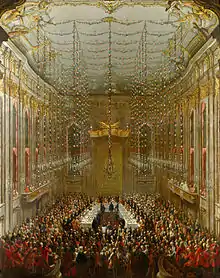Supper
Supper was originally a secondary lighter evening meal. The main meal of the day, called dinner, used to be served closer to what is known as lunchtime, around the middle of the day, but crept later over the centuries, mostly over the course of the 19th century. When dinner was still at the early time, eating a lighter supper in the evening was very common; it was not always the last meal of the day, as there might be a tea later. Reflecting the typical custom of 17th century elites, Louis XIV dined at noon, with a supper at 10pm.[1] Even when dinner was in the early evening, supper was served at, or on return from, a ball, and might be after other evening excursions. At an English ball in 1791, supper was served to 140 guests at 1:00am.[2] They would all have had dinner at home many hours earlier, before coming out. Other, grander, balls served supper even later, up to 3:30 am., at a London ball given in 1811 by the Duchess of Bedford.[3]
| Part of a series on |
| Meals |
|---|
 |
| Meals |
| Components and courses |
| Related concepts |
The modern usage of "supper" varies considerably; sometimes supper is still used to describe a light snack or meal in the evening, either after or instead of dinner, but often it replaces dinner as the term for the main evening meal. Many people never use the term at all.
Etymology
| Look up supper in Wiktionary, the free dictionary. |
The term is derived from the French souper, which is used for this meal in Canadian French, Swiss French, and in Belgian French. It is related to soup. It is also related to the Scandinavian words for soup, soppa or suppe and the German word for soup, Suppe. The Oxford English Dictionary, however, suggests that the root, sup, remains obscure in origin.[4]
Modern usage

In modern usage, "supper" may refer to, on largely class-based distinctions, either a late-evening snack (working- and middle-class usage) or else to make a distinction between "supper" as an informal family meal (which would be eaten in the kitchen or family dining room) as opposed to "dinner", especially as a "dinner party", a generally grander affair with guests from outside the household, which would be eaten in the best dining room.[6]
North America
The distinction between dinner and supper was common in United States farming communities into the twentieth century, especially in the Mid-West and the American South, though today, most Americans consider the two synonyms and strongly prefer the term dinner for the evening meal. During World War II, rations in the U.S. military were still divided into breakfast, dinner, and supper, using the traditional designations for meals. In most parts of the United States and Canada today, "supper" and "dinner" are considered synonyms (although supper is a more antiquated term). In Saskatchewan, and much of Atlantic Canada, "supper" means the main meal of the day, usually served in the late afternoon, while "dinner" is served around noon. "Dinner" is used in some areas, such as Newfoundland and Labrador, to describe the noon meal as well as special meals, such as "Thanksgiving dinner", "flipper dinner" or "Christmas dinner", the evening meal being "supper". The word "supper" is also regionally reserved for harvest meals put on by churches and other community organizations: "fowl suppers" or "fall suppers" (featuring turkey) are common in Canada; "pancake suppers" given by church groups were once a tradition in the United States; and "bean suppers" (featuring baked beans) were traditional in New England and especially the state of Maine.[7]
See also
References
- Strong, 250
- "Frances Bankes' ball at Kingston Lacy 19 December 1791 (From Regency History)". Regency History.net. Retrieved 3 January 2014.
- Day, Ivan, "Pride and Prejudice - Having a Ball", Food Jottings
- "Oxford English Dictionary". Oxford University Press. Retrieved 17 May 2012.
- "Wedding Supper". www.google.com. Retrieved 9 December 2015.
- Post, Emily (1945). Etiquette: the blue book of social usage (10th ed.). Funk & Wagnalls. p. 375.
- "Research – Foodways Research: A Taste of Maine". The University of Maine Folklife Center. Retrieved September 8, 2013.
- Strong, Roy, Feast: A History of Grand Eating, 2002, Jonathan Cape, ISBN 0224061380